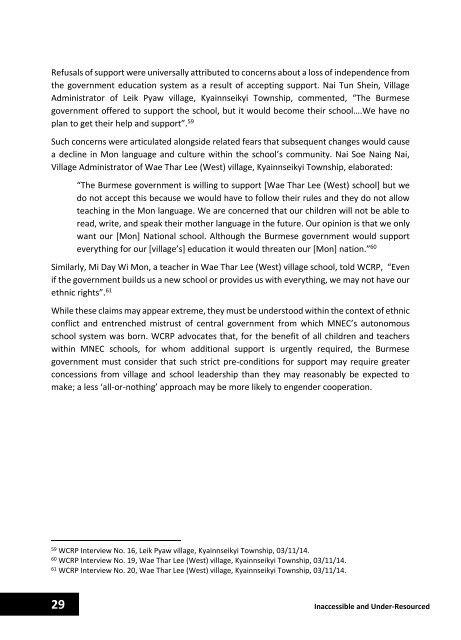Final-Edition
Final-Edition
Final-Edition
Create successful ePaper yourself
Turn your PDF publications into a flip-book with our unique Google optimized e-Paper software.
Refusals of support were universally attributed to concerns about a loss of independence from<br />
the government education system as a result of accepting support. Nai Tun Shein, Village<br />
Administrator of Leik Pyaw village, Kyainnseikyi Township, commented, “The Burmese<br />
government offered to support the school, but it would become their school….We have no<br />
plan to get their help and support”. 59<br />
Such concerns were articulated alongside related fears that subsequent changes would cause<br />
a decline in Mon language and culture within the school’s community. Nai Soe Naing Nai,<br />
Village Administrator of Wae Thar Lee (West) village, Kyainnseikyi Township, elaborated:<br />
“The Burmese government is willing to support [Wae Thar Lee (West) school] but we<br />
do not accept this because we would have to follow their rules and they do not allow<br />
teaching in the Mon language. We are concerned that our children will not be able to<br />
read, write, and speak their mother language in the future. Our opinion is that we only<br />
want our [Mon] National school. Although the Burmese government would support<br />
everything for our [village’s] education it would threaten our [Mon] nation.” 60<br />
Similarly, Mi Day Wi Mon, a teacher in Wae Thar Lee (West) village school, told WCRP, “Even<br />
if the government builds us a new school or provides us with everything, we may not have our<br />
ethnic rights”. 61<br />
While these claims may appear extreme, they must be understood within the context of ethnic<br />
conflict and entrenched mistrust of central government from which MNEC’s autonomous<br />
school system was born. WCRP advocates that, for the benefit of all children and teachers<br />
within MNEC schools, for whom additional support is urgently required, the Burmese<br />
government must consider that such strict pre-conditions for support may require greater<br />
concessions from village and school leadership than they may reasonably be expected to<br />
make; a less ‘all-or-nothing’ approach may be more likely to engender cooperation.<br />
59<br />
WCRP Interview No. 16, Leik Pyaw village, Kyainnseikyi Township, 03/11/14.<br />
60<br />
WCRP Interview No. 19, Wae Thar Lee (West) village, Kyainnseikyi Township, 03/11/14.<br />
61<br />
WCRP Interview No. 20, Wae Thar Lee (West) village, Kyainnseikyi Township, 03/11/14.<br />
29 Inaccessible and Under-Resourced


